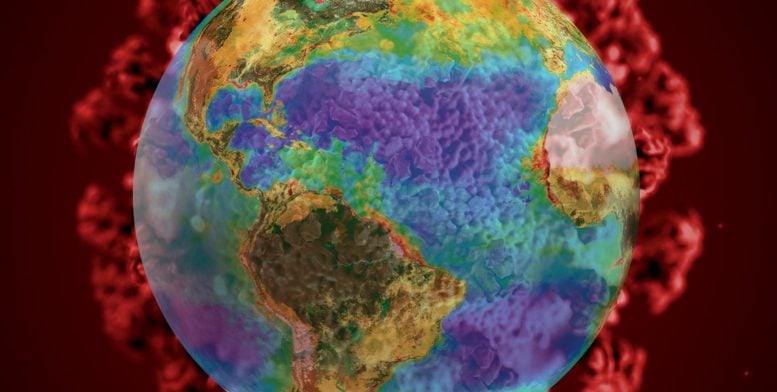
A new call related to COVID-19 has been added to the Permanently Open Call, which is part of ESA’s Earth Observation Science for Society program. The aim is to see how satellite data can be used to understand the effects that the virus is imposing on society, the economy, and the environment. Credit: ESA
The coronavirus COVID-19 pandemic has virtually paralyzed daily life as we know it. Even when the spread of this highly infectious disease has been stemmed, the world will face huge challenges getting back to normal. To help support experts working in Europe’s research centers and technical organizations during these unprecedented times, ESA has issued two new initiatives related to understanding the effects that COVID-19 is imposing on society, the economy, and the environment.
As road traffic in cities around the world comes to a near standstill, Europe’s Copernicus Sentinel-5P satellite mission is providing key information about changes in concentrations of atmospheric pollutants such as nitrogen dioxide. However, there remains huge potential to use Earth observation data to shed new light on other societal and economic changes currently taking place.
To see how Earth-observing missions could be further used to explore the effects of COVID-19, ESA has issued a new call for proposals. The aim is to see how satellite data can be used, for example, to map changes around transport networks, commercial ports and heavy industry such as oil refineries.
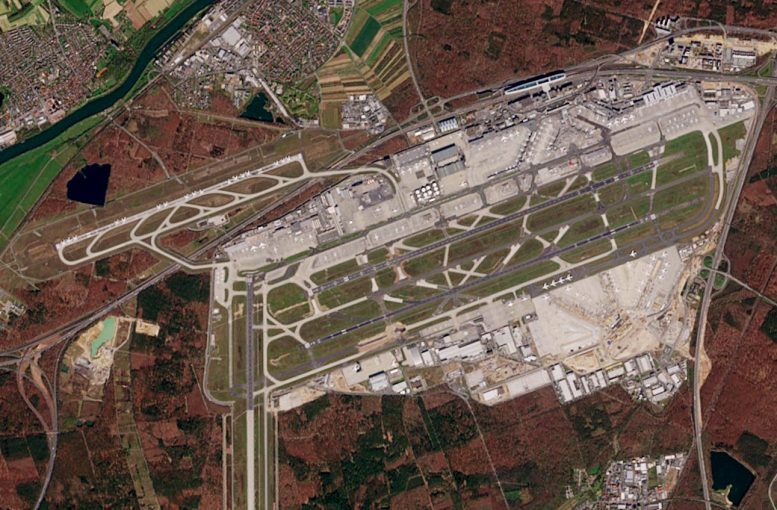
Normally busy, Frankfurt airport stands still amid the COVID-19 crisis. The image was captured by the Copernicus Sentinel-2 mission on March 30, 2020. Credit: Contains modified Copernicus Sentinel data (2020), processed by ESA
ESA’s Director of Earth Observation Programmes, Josef Aschbacher, said, “COVID-19 is putting society under huge strain. While ESA isn’t really placed to help forecast the progression of the virus, we certainly continue to have a wealth of data streaming back to us from some of the most sophisticated satellites ever built as well as new artificial intelligence technologies that can be used to understand and monitor some of the societal shifts.
“Innovation is key to using satellite data to help serve society during these challenging times and we trust that our new call will return some valuable proposals.”
This new call has been added to the Permanently Open Call, which is part of ESA’s Earth Observation Science for Society program.
In addition to the new call, on April 6, 2020, ESA in coordination with the European Commission is launching a special edition of the Custom Script Contest. The contest calls for remote sensing experts, machine learning scientists as well as the interested public to submit ideas on how satellite data could help mitigate the situation for economic sectors such as industry, commerce, transport, and agriculture, but is also open to other ideas. Anyone can contribute an idea.
The best contributions will be rewarded with cash prizes on a weekly basis. Also, every month there will be a prize for the best idea in each category and a final prize for the best overall contribution.
Grega Milcinski, from Sinergise said, “Participants should simply compose a set of slides presenting their ideas using the Earth observation data, tools, and machine learning technologies made easily available for all skill levels. These will be evaluated on a weekly basis in order to make use of them as soon as possible – the COVID-19 situation needs it!”
About the Copernicus Sentinels
The Copernicus Sentinels are a fleet of dedicated EU-owned satellites, designed to deliver the wealth of data and imagery that are central to the European Union’s Copernicus environmental program. The European Commission leads and coordinates this program, to improve the management of the environment, safeguarding lives every day. ESA is in charge of the space component, responsible for developing the family of Copernicus Sentinel satellites on behalf of the European Union and ensuring the flow of data for the Copernicus services, while the operations of the Copernicus Sentinels have been entrusted to ESA and EUMETSAT.

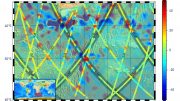
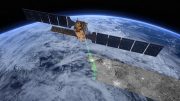
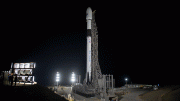
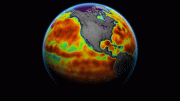
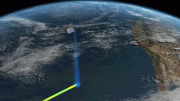
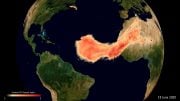
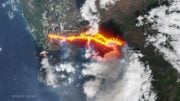
The viruses are the way of the new formations and species performed in Earth and everywhere in endlessness as result of the change time after time of the magnetism of the Earth in cooperation with the magnetism of the endlessness around. It is very important to know this performance because by means of it would be known the proper measures to fight against the virus. But the way how the formations and species are performed are not known and everything by the science about that is given almost in an abusively manner. However the change of magnetism is absolutely the virus and all we are inside this change or we are inside the virus and virus is inside us. The work of every component of our organism is inside this change or inside the virus and the only thing remained by those to do is the adaptation. The change of magnetism is performed differently around the Earth and the intensity of the appearance of the virus in different parts of the Earth is different. In the same moment the difference of the ability of every organism to be adapted toward this change is different. Conform to the ability of the organism of everyone to be adapted, the virus inside unexceptionally of everyone is in different stage of the development. If the organism is not able to follow this change the virus is appeared at once visually risking the life. Otherwise inside with virus you live comfortably. The best way of the adaptation what depend on everyone is walking, running, vaccinating healthy meal etc. On the other side the world policy about the bacteriologic weapons nuclear weapons etc., etc., must change immediately because are just this policies that the adaptation of our organism is realized difficultly, etc., etc.